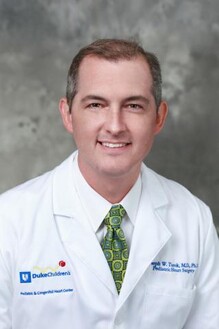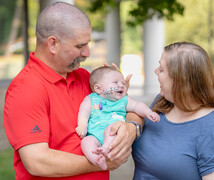Duke surgeons successfully performed the first "donation after circulatory death” (DCD) heart transplant in a pediatric patient in the U.S. The transplant team used the DCD process along with an investigational device that kept the donated heart pumping before transplantation in late August 2021. These advancements could lead to more hearts being available, and faster, for kids with life-threatening heart disease.
What Is Donation After Cardiac Death?
Duke is one of a handful of U.S. centers studying a new way to transplant donated hearts that could not be used in the past.
Traditionally, a heart can be recovered for donation only after the donor meets strict criteria for brain death following a severe, irreversible neurologic injury. The heart must still be beating well to be used for transplant.
However, some people with severe, irreversible brain injuries may not meet all of the strict criteria for death. Using the DCD process, the loved ones of these carefully selected patients choose to remove life support, and the heart is allowed to stop in a very controlled way. Then the heart is recovered for transplant. This process is already used in the U.S. for other organs like lungs, livers, and kidneys, and in Europe and Australia for hearts.
Duke Performed the First DCD Heart Transplant in 2019
Duke surgeons performed the first DCD heart transplant in the U.S. in December 2019. Others have been completed at Duke and around the country since. However, this was the first time the process was used in a child.
"This is a landmark achievement for children with end-stage heart failure,” said Joseph Turek, MD, PhD, chief of pediatric cardiac surgery at Duke who helped retrieve the donated organs. Duke heart transplant surgeon Jacob Schroder, MD, helped lead the eight-hour surgery, which also included a team of four nurses.
"It’s heartbreaking that children die while waiting for a heart transplant," said Dr. Schroder. "Every advancement that makes more hearts available is one that saves lives. We are eager to explore all options that give children and their families hope.”







